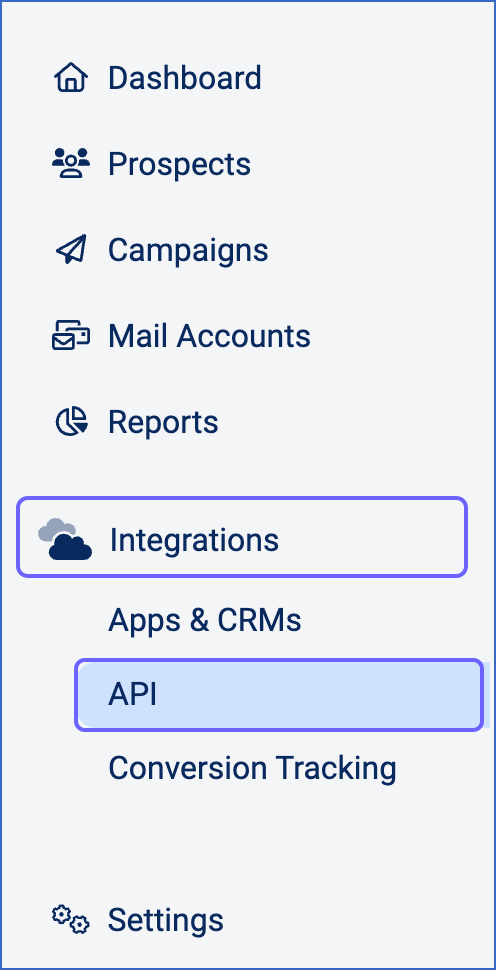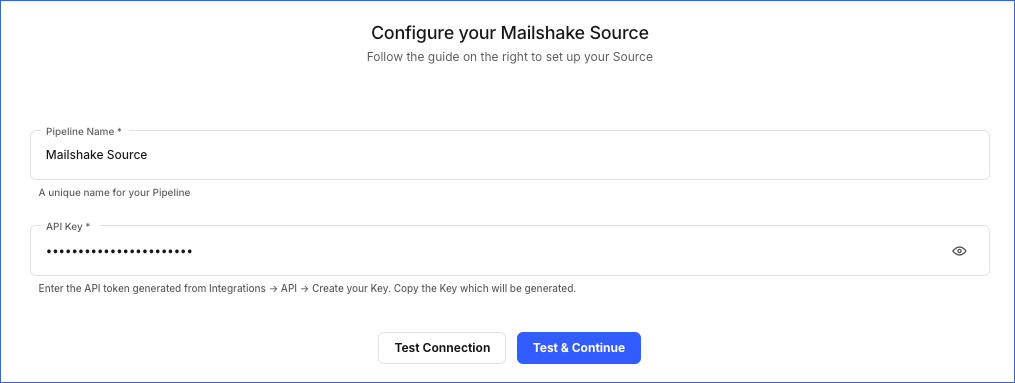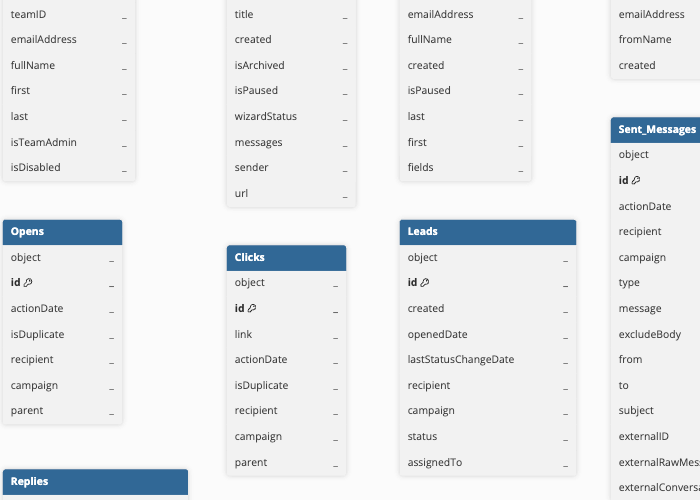Mailshake
On This Page
Mailshake is a sales engagement platform that helps you to automate the process of sending personalized emails at scale, allowing you to accelerate and optimize every interaction throughout the sales process. You can easily manage and track your leads by monitoring the action on every mail that you send.
Mailshake uses an API key to identify Hevo and authorize the request for accessing account data.
Prerequisites
-
An active Mailshake account from which data is to be ingested exists.
-
The API key is available to authenticate Hevo on your Mailshake account.
-
You are assigned the Team Administrator, Team Collaborator, or Pipeline Administrator role in Hevo to create the Pipeline.
Obtaining the API Key
You require an API key to authenticate Hevo on your Mailshake account. The API key does not expire and can be reused for all your Pipelines.
To create the API key:
-
Log in to your Mailshake account.
-
In the left navigation pane, click Integrations, and select API from the drop-down.

-
On the API page, scroll down to Your Team Access.

-
Copy the API key and account ID and save it securely like any other password. Use this key while configuring your Hevo Pipeline.
Configuring Mailshake as a Source
Perform the following steps to configure Mailshake as the Source in your Pipeline:
-
Click PIPELINES in the Navigation Bar.
-
Click + Create Pipeline in the Pipelines List View.
-
On the Select Source Type page, select Mailshake.
-
On the Select Destination Type page, select the type of Destination you want to use.
-
On the Configure your Mailshake Source page, specify the following:

-
Pipeline Name: A unique name for the Pipeline, not exceeding 255 characters.
-
API Key: The API key that you copied from your Mailshake account.
-
-
Click Test & Continue.
-
Proceed to configuring the data ingestion and setting up the Destination.
Data Replication
| For Teams Created | Default Ingestion Frequency | Minimum Ingestion Frequency | Maximum Ingestion Frequency | Custom Frequency Range (in Hrs) |
|---|---|---|---|---|
| Before Release 2.21 | 1 Hr | 1 Hr | 24 Hrs | 1-24 |
| After Release 2.21 | 6 Hrs | 30 Mins | 24 Hrs | 1-24 |
Note: The custom frequency must be set in hours as an integer value. For example, 1, 2, or 3, but not 1.5 or 1.75.
-
Historical Data: In the first run of the Pipeline, Hevo ingests all the existing data for the selected objects from your Mailshake account and loads it to the Destination.
-
Incremental Data: Once the historical load is complete, all new and updated records for the Clicks and Opens objects are ingested as per the ingestion frequency. The remaining objects are ingested in Full Load mode.
Schema and Primary Keys
Hevo uses the following schema to upload the records in the Destination database. For a detailed view of the objects, fields, and relationships, click the ERD.
Data Model
The following is the list of tables (objects) that are created at the Destination when you run the Pipeline:
| Object | Mode | Description |
|---|---|---|
| Campaigns | Full | Contains the details of all the marketing emails sent to multiple recipients to increase sales of a product or service. |
| Clicks | Incremental | Contains the details of the recent links clicked in your campaign emails. |
| Leads | Full | Contains the details of all prospective customers. |
| Members | Full | Contains the details of all the users who have access to your Mailshake account. |
| Opens | Incremental | Contains the details of most recent emails which are opened by the recipients. |
| Recipients | Full | Contains the details of all the users who have received the campaign emails. |
| Replies | Full | Contains the details of the responses received for the emails. |
| Senders | Full | Contains the details of all the email IDs from which the campaign email has been sent. |
| Sent Messages | Full | Contains the list of the most recent emails sent to recipients during a campaign. |
Source Considerations
-
Pagination: Each API response for each Mailshake object fetches one page with up to 100 records per page.
-
Rate Limit: Mailshake imposes a limit of 1000 API calls per minute per account. If the limit is exceeded, Hevo defers the ingestion till the limits reset.
Limitations
-
Hevo currently does not support deletes. Therefore, any data deleted in the Source may continue to exist in the Destination.
-
Hevo does not provide you with the option to select the historical sync duration for loading historical data. All the historical data in your Mailshake account is loaded.
-
Hevo does not load data from a column into the Destination table if its size exceeds 16 MB, and skips the Event if it exceeds 40 MB. If the Event contains a column larger than 16 MB, Hevo attempts to load the Event after dropping that column’s data. However, if the Event size still exceeds 40 MB, then the Event is also dropped. As a result, you may see discrepancies between your Source and Destination data. To avoid such a scenario, ensure that each Event contains less than 40 MB of data.
Revision History
Refer to the following table for the list of key updates made to this page:
| Date | Release | Description of Change |
|---|---|---|
| Nov-12-2025 | NA | Updated the document as per the latest Hevo UI. |
| Sep-18-2025 | NA | Updated section, Configuring Mailshake as a Source as per the latest UI. |
| Jul-07-2025 | NA | Updated the Limitations section to inform about the max record and column size in an Event. |
| Jan-07-2025 | NA | Updated the Limitations section to add information on Event size. |
| Mar-05-2024 | 2.21 | Updated the ingestion frequency table in the Data Replication section. |
| Dec-07-2022 | 2.03 | New document. |
